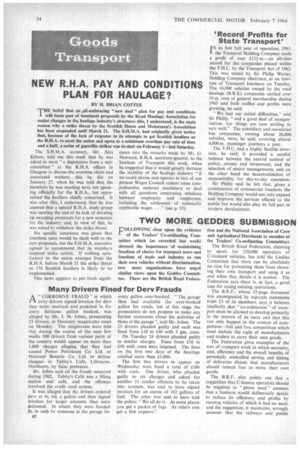TWO MORE GEDDES SUBMISSION
Page 36

If you've noticed an error in this article please click here to report it so we can fix it.
FOLLOWING close upon the evidence of the Traders' Co-ordinating Committee which (as recorded last week) stressed the importance of maintaining freedom of choice for transport users and freedom of trade and industry to run their own vehicles without discrimination, two more organizations have urged similar views upon the Geddes Committee. These are the British Road Federa
tion and the National Association of Corn and Agricultural Merchants (a member of the Traders' Co-ordinating Committee).
The British Road Federation, claiming to speak for 250,000 operators of C-licensed vehicles, has told the Geddes Committee that there can he absotutely no case for preventing them from choosing their own transport and using it as and when they decide it is needed. The Federation says there is, in fact, a good case for easing existing restrictions.
The B.R.F., whose I2-page document was accompanied by separate statements from 23 of its members, says it believes implicitly that " co-ordination " of transport must be allowed to develop primarily in the interest of its users and that this can only happen in the context of competition—full and free competition which must include the right of manufacturers and traders to carry their own goods.
The Federation gives examples of the sort of transport work in which necessity, cost, efficiency and the overall benefits of personally controlled service and timing of deliveries dictate that manufacturers should remain free to move their own goods.
The B.R.F. also points out that a suggestion that C-licence operators should be required to "prove need" assumes that a business would deliberately decide to reduce its efficiency and profits by running vehicles of which it had no need, and the suggestion, it maintains, wrongly assumes that the railways and public




















































































































